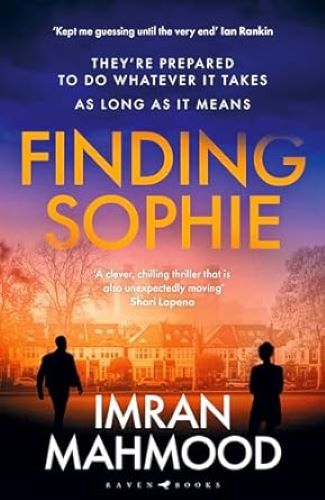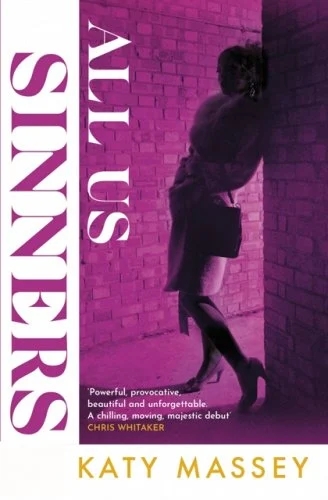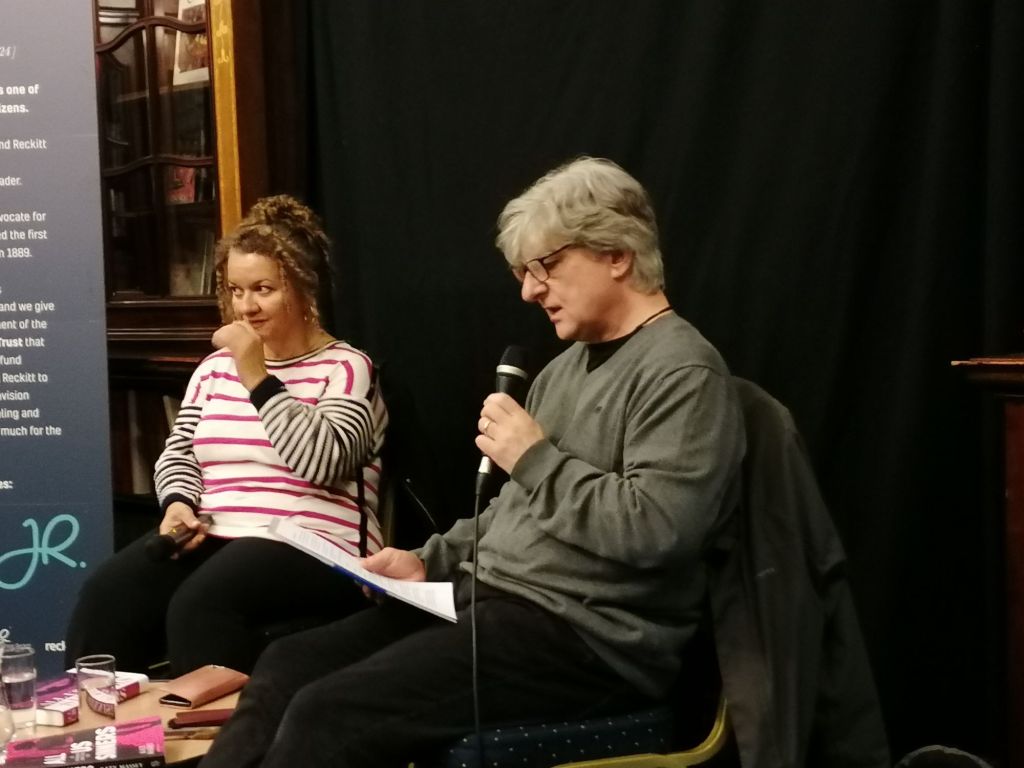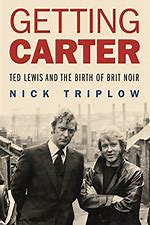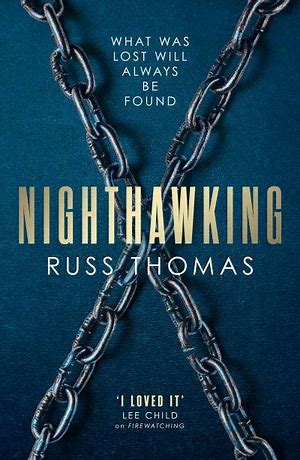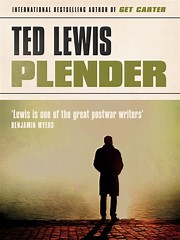On Wednesday 17 April Imran Mahmood @imranmahmood777 was the guest of Hull Noir https://www.hullnoir.com/ @HullNoir to talk about his latest crime novel Finding Sophie and how he manages to juggle a writing career with being a criminal barrister. Host for the evening and the man asking the questions was local crime author Nick Quantrill https://www.nickquantrill.co.uk/ @NickQuantrill a co-director of Hull Noir.

As a rule, I attend Hull Noir events in person, but this time I was in La Palma enjoying a pleasant spring break in the Canary Islands sunshine. Fortunately, as well as these events being free to attend in person, they also provide a free livestream so there was no reason to miss out. As you will see from the photograph of my laptop screen the picture quality was excellent, as was the sound. Thanks to the wonders of X/Twitter I was even able to reserve a signed and dedicated copy of Finding Sophie from Julie of J.E. Books https://jebookshull.wordpress.com/ @JEBooksHull, our local independent bookseller who can be found at all of these events.
The event, including a Q&A session ran for an hour but there follows a flavour of what was discussed.
Background
In writing Finding Sophie IM wanted to explore the very worst thing that can happen to parents, a child going missing, what their reactions are and how they deal with a sense of grief it causes. Here the reactions of the parents are very different, but he is trying to find the real voice of the characters.
NQ added that he was impressed with the social realism that runs through Finding Sophie, the threats of violence (but don’t kill the dog!), the help of a clairvoyant and how the sex worker was ignored.
Teachers
NQ pointed out that both the parents in the novel are teachers and asks why. IM said that he wanted to acknowledge the role that teachers has played in forming his life, those that have helped and inspired him to achieve what he has. He jokingly remarked that teenagers were terrifying and that teachers have to deal with them everyday at school. It is easy for adults to dismiss teenagers for having it easy, but they must deal with a world that is constantly changing, ever faster, and also come with the physical and mental changes as they go through puberty and into adulthood.
Why crime?
NQ wanted to know why write crime fiction and not some brilliant legal courtroom drama, of which he observed there were so few are set in the UK. Since the days of Rumpole of the Bailey there has been so little which IM puts down, at least in some degree, to all the paraphernalia of wigs and gowns which hide actors on the screen. The main difference he points out is that the UK courts are much slower and less dramatic. A forensically realistic UK legal drama would be a rather boring read IM suggests. When he wrote his first novel, he asked his wife for her opinion on his draft, and she told him to the cut the boring legal bits.
So, he naturally decided to write crime, coming into daily contact with a wide variety of miscreants and creepy characters. Of course he has some great stories to tell which I won’t elaborate here, as that would be akin to spoiling a stand-up comedian’s act.
Screenwriting
IM’s 2017 novel You Don’t Know Me was adapted for television, he was fortunate to have some input into the production, but it was Tom Edge who wrote the screenplay. IM has since been asked to work on screenwriting, which he is at pains to stress is a whole different skill set to being a novelist. The main difference is that you cannot get into the characters mind and express their thoughts, so as there is a difference between showing and telling, here the screenplay is much more direct and tells you what happens. The actual writing process is different too, particularly when it comes to the editing stage. A novel will have an editor, possibly two and go through perhaps three or four drafts; a screenplay could have the input of as many as fifty people at the editing stage before it is filmed.
Work-life balance
NQ wanted to know how he could manage to juggle two demanding careers. IM said that he has always enjoyed writing, he has done it in some form most of his life and writing late into the night is ingrained. His success has meant that he has become more selective in the legal work he accepts, which allows him a little more time to write and now he is able to produce a book a year.
Finding Sophie can be purchased direct from the publisher here
The blurb
Sophie King is missing.
Her parents, Harry and Zara, are distraught; for the last seventeen years, they’ve done everything for their beloved only daughter and now she’s gone.
The police have no leads, and Harry and Zara are growing increasingly frantic, although they are both dealing with it in very different ways. Increasingly obsessed with their highly suspicious neighbour who won’t open the door or answer any questions, they are both coming to the same conclusion. If they want answers, they’re going to have to take the matter into their own hands.
But just how far are they both prepared to go for the love of their daughter?
The author

Imran Mahmood is a practicing barrister with thirty years’ experience fighting cases in courtrooms across the country. His previous novels have been highly critically acclaimed: You Don’t Know Me was a BBC Radio 2 Book Club choice, Goldsboro Book of the Month and was shortlisted for the Glass Bell Award; both this and I Know What I Saw were longlisted for Theakston Crime Novel of the Year and the CWA Gold Dagger. You Don’t Know Me was also made into a hugely successful BBC1 adaptation in association with Netflix. When not in court or writing novels or screenplays he can sometimes be found on the Red Hot Chilli Writers’ podcast as one of their regular contributors. He hails from Liverpool but now lives in London with his wife and daughters.
Coming up in May at Hull Noir:

